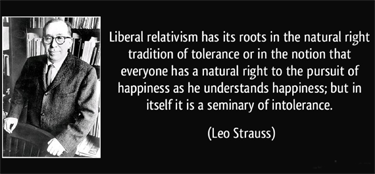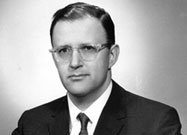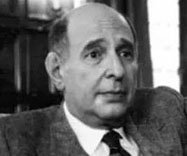Leo Strauss and the Critique of Liberal Modernity
Critiques of Liberalism, Leo Strauss, Philosophy, The Closed Society

Matthew Rose, in First Things, describes Leo Strauss’s critique of Liberalism and the Open Society.
…[A]fter his move to the University of Chicago in 1949[,] Strauss worried that Western thinkers were no longer capable of contemplating perspectives beyond liberalism, even against liberalism, from which to judge the present. Far from constituting a threat to clear thinking, such a perspective is essential to it—for only outside the open society can we identify its virtues and its vices, and gain the strength to endure its discontents. But if we are to reach this horizon, Strauss argued, a popular prejudice often directed against critics of liberalism must be rejected. For what is mislabeled “nihilism” is not a destructive doctrine at all. It is a protest on behalf of something of the highest human importance—something liberalism dismisses at its peril.
What kind of protest? In answering this question, Strauss reflected on the generation of students who had been intellectually formed and politically radicalized during the interwar period. As his later writings would make clear, these reflections drew on his own experiences as a student in the early 1920s, when he struggled to reconcile his devotion to Max Weber with his growing interest in Martin Heidegger, who seemed willing to address questions about human existence that no other living German philosopher would. These students, Strauss recalled, had been shattered by war, disoriented by the collapse of traditional authorities, and disturbed by a culture that seemed to celebrate transgression. For many of them, the Weimar-era experiment with parliamentary democracy had proven a failure. Only a rejection of the “cancer” of liberalism, as one author called it, could save them.
Strauss’s portrait of his classmates was unsparing, but not disdainful. Strauss described young men full of vehement certainty about what they rejected, but inarticulate and unreflective about what they affirmed. “The prospect of a pacified planet, without rulers and ruled,” he observed, “was positively horrifying to [them].” Strauss lamented that their passions found no outlet other than the crudest propaganda. Unable to understand or express themselves in any other way—Strauss noted that they had largely rejected Christian belief—they gave voice to savage forms of group identity. The mark of barbarism, Strauss explained, was the belief that truth and justice should be defined in terms of ethnic or racial membership.
But Strauss acknowledged that these students, shaped by defeat, conflict, and social disintegration, were inspired by an ideal—an ideal whose dangers they did not understand but whose allure they keenly felt. Here we approach the heart of Strauss’s lecture, which sought to place these interwar students and their ideal in a broader intellectual history. Strauss cautioned that he sought not to pardon what deserved condemnation, but to make intelligible what required understanding. He therefore challenged his class to see in the youthful German protest what many had failed to perceive two decades earlier: its moral basis. This protest against liberalism was not fundamentally inspired by a love of war or a love of nation, Strauss insisted. Nor could it be explained by material or class interests. It was inspired, as he put it in a bracing passage, by “a love of morality, a sense of responsibility for endangered morality.”
Strauss named this outlook the morality of the “closed society.” No sensitive reader of the lecture can avoid being struck by the intensity of the passages in which Strauss describes the gravity of the challenge this “endangered morality” poses to the “open society.” What is the closed society? Strauss didn’t identify it with any one people, tradition, or form of government. By the “closed society” he didn’t mean non-Western cultures, pre-Enlightenment thought, or even undemocratic polities. The closed society represented a perennial moral possibility, whose roots are found in every human soul and whose demands must be confronted by every human community. In its most common expression, the closed society levels a familiar accusation: that the open society is immoral, or at least amoral, because it jeopardizes the very possibility of living a virtuous life.
Strauss assumed his American students might have difficulty seeing the possible strengths, to say nothing of the seductive appeal, of a way of life associated with ignorance and bigotry. He therefore tried to show them how liberal and democratic ideals might appear from a perspective that denies their moral legitimacy—not out of resentment or bad faith, but out of loyalty to a higher order of values. The rights of man, the relief of the human estate, the happiness of the greatest possible number—for advocates of the open society, these are ideals that have inspired social progress. They are part of a shift in modern consciousness, through which we have recognized our power to change the present, rather than simply accept the authority of the past. But to defenders of the closed society, Strauss argued, the moral prestige of these slogans evinces a different kind of shift. It is a sign that humanity has been debased rather than ennobled.
To draw his listeners into anti-liberal ways of thinking, Strauss sketched the development of modern political thought from the perspective of the closed society. This interpretation casts the arc of modernity in a disturbing light, depicting as decline what Enlightenment thinkers hailed as advance. It sees modernity as the story of how and why Western societies chose to lower their moral ideals, exchanging the demanding codes of antiquity and biblical religion for the comfortable norms of commercial society, legal proceduralism, and bourgeois life. Heroic ideals, attainable only by the exceptional few, were defined down for the ordinary many; ideals that promoted spiritual or intellectual excellence were balanced by those promoting health and prosperity; ideals that imposed self-denial were replaced by those that indulged self-expression.
As Strauss’s reading of modernity suggests, the closed society is defined by what it affirms no less than by what it rejects. He emphasized that its conflict with the open society is ultimately over the most fundamental question: Which way of life is best for man? For defenders of the closed society, human life should be ordered to a political end whose achievement requires the highest and rarest human qualities. So demanding is its vision of moral excellence, so uncommon are the virtues it requires, and yet so necessary is it to the sustaining of human life, that its fulfillment involves the greatest personal risk. As Strauss described it:
Moral life . . . means serious life. Seriousness, and the ceremonial of seriousness . . . are the distinctive features of the closed society, of the society which by its very nature, is constantly confronted with, and basically oriented toward, the Ernstfall, the serious moment. . . . Only life in such a tense atmosphere, only a life which is based on constant awareness of the sacrifices to which it owes its existence, and of the necessity, the duty of sacrifice of life and all worldly goods, is truly human.
Duty, sacrifice, danger, struggle—here we enter the charged atmosphere of a moral world that Strauss feared his students, and not only his students, failed to understand. It saw the best human life as one that dares to risk all for the sake of heroic possibilities. It saw the desire to pledge oneself to a great cause and to prostrate oneself before great authorities as essential to human virtue. In later writings, Strauss would examine a tension between the life of philosophy and the life of faith, a tension that he believed was foundational to Western civilization. But the conflict between the open and closed societies is not a conflict between reason and revelation. It is a conflict over the necessity of life-and-death struggles for human excellence. If the open society is constituted by free argument and equal recognition, the closed society is formed by loyalty, courage, sacrifice, and honor. It celebrates the virtues that it believes make political order possible: the willingness to forgo material comforts, to close ranks against outsiders and oppose enemies, and, above all, to fight to the death with no thought for profit or pleasure. Though these virtues animate other spheres of life, they are, in their deepest origin and highest expression, martial virtues.
At the time of his lecture, Strauss was completing his famous essay “Persecution and the Art of Writing,” which he privately called a “bomb” that would forever change how scholars interpreted the history of ideas. It argued that many Western philosophers had protected themselves from political persecution (and shielded their communities from intellectual harm) by carefully disguising their most subversive and heterodox views from average readers. Strauss’s lecture has an element of indirection that suggests its author’s desire to shield himself from attack. It draws upon his experiences in right-wing movements of the 1920s as well as from his careful study of the controversial legal theorist Carl Schmitt, who interpreted political life in light of moments of supreme crisis that reveal the true nature of authority. Strauss became a Zionist at age seventeen, and his earliest writings evinced a concern that liberal ideals encouraged frivolity and complacency, not least among assimilated Jews. Strauss eventually drifted away from active Jewish life, but he preserved a lifelong distrust of liberalism and its “permissive egalitarianism.”
But in defending the martial virtues of courage, heroism, and loyalty, Strauss was not simply giving guarded expression to past political views. He was giving voice to a moral ideal that defenders of democracy were jeopardizing, at significant human cost. That ideal insisted that these are the virtues through which, and only through which, a man can prove himself to be a man in full. It contended that what makes us human is not the way we pursue and enjoy the goods of bodily life, however refined our habits might be. Rather, we prove our humanity only by exercising our radical ability to contradict those goods, only by risking our lives for a value greater than mere survival. To live as a human being is to fight to the death for something higher than life. Within this moral world—a world so fundamentally hostile to liberal modernity—man is not made for comfort and security. He is tempted by them. The man who wishes truly to live must flirt with death.
Strauss was aware of the destructive power of this impulse and its pursuit of meaning through confrontation with annihilation. But before it could be corrected, he believed, its moral critique of liberal modernity had to be confronted. Proponents of the closed society regard the open society as degrading not simply because it places bodily safety and well-being at its political center. They regard it as degrading because it diminishes the soul’s need for moral risk, demotes the virtues needed for pursuing and protecting the highest things, and devalues the men who strive to live by its severe code. For those, such as Ernst Jünger, who found the most sublime virtues in the trenches of a world war, the open society was hypocritical. It lived by achievements it did not properly honor, or merely pretended to honor, and in doing so lied about the basic facts of human experience. Its dream of a world of freedom and equality, a world in which everyone was happy and satisfied and at peace—such a world was no dream, but a posthuman nightmare, “in which no great heart could beat and no great soul could breathe.” …
Strauss certainly saw the potential for savagery in [the] rebellion against the open society and its intellectual gatekeepers. He was alarmed by the ease with which theoretical attacks on liberalism could turn into excuses for political evil. But as Strauss looked to the war raging in Europe and imagined a future that learned from its mistakes, he proposed a strikingly different form of education. He argued that good teachers should not seek to dispel the allure of the closed society; instead, they should carefully draw students directly inside of it. This pedagogy would enable students to experience the power of the closed society’s moral demands, to sense the appeal of its political life, and to feel challenged by its vision of human excellence.
Strauss didn’t wish to turn his students into sophisticated enemies of liberalism. His goal was to turn them into virtuous defenders of democracy. But to become true patrons of the open society, they needed qualities of character that could be developed only through a proper appreciation of traditional society. The open society was right to order its common life through the exercise of reason and the arts of civility. But the closed society was also right about some important things. It acknowledged our need to be loyal to a particular people, to inherit a cultural tradition, to admire inequalities of achievement, to reverence the authority of the past, and to experience self-transcendence through self-sacrifice. It acknowledged as well the importance of a leadership class whose decisions expose them to special risk rather than shielding them from it. As Strauss observed, these are permanent truths, not atavisms, no matter how unpalatable they are to the progressive-minded. A society that cannot affirm them invites catastrophe, no less than does a society that cannot question them.





